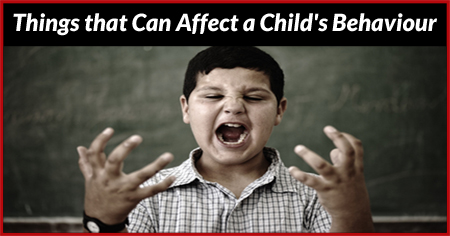 Parents have to play a crucial role in shaping the behaviour of children. Therefore, it is a must for them to be aware of the things that that affect their behaviour. Let us take a look at some things that affect a child’s behaviour.
Parents have to play a crucial role in shaping the behaviour of children. Therefore, it is a must for them to be aware of the things that that affect their behaviour. Let us take a look at some things that affect a child’s behaviour.Raising children in today’s world can be a tremendous task, requiring a lot more than simply fulfilling their needs. Studies in child psychology have proved that a child’s mind is much more delicate and intense than we give credit for. Numerous factors such as parental behaviour, basic requirements, environment and a general healthy development greatly affect the child’s
behaviour<.
It is known that children who are well-cared for grow up to be healthy and happy individuals, while those who grow up in negative surroundings have low self-esteem and have difficulties in adjustment. What could be some of the ways that could affect your child’s behaviour?
1. Basic Requirements
A young child is completely dependent on her parents for food, shelter, clothing and love. Research emphasises on healthy food for young children and the completed avoidance of foods rich in sugar. The use of artificial colours and sweeteners can also affect a child, and must be discarded from the diet. Though the results were varied in the percentage of children who were affected by diet, some other studies found no relation between the cause and effect. However, lack of sleep is a big culprit for
inappropriate behaviour, daytime sleepiness and poor grades in school.
2. Childhood Trauma
Childhood experiences such as physical, emotional or social trauma trigger a great deal of negative feelings in children. Such reasons may include separation between parents, loss of a family member or pet, minor illness, abuse or unstable homes which may end up in emotional isolation of the child. Symptoms of childhood trauma include irritability, mood swings, anger, fear, sadness or anxiety. Parents should observe the behaviour of their children and take the help of professional therapists to heal such issues with consistent love, care and attention and help children grow up as emotionally and mentally strong individuals.
3. Discipline
Parents and caregivers are responsible for teaching
discipline to their child, focussing on what is right, what is wrong. Though discipline is integral, how parents react to
negative behaviour and change it into a positive learning experience affects a child’s behaviour. On the other hand, authoritative parents end up raising children who are reckless, lonely and often subjected to unhealthy addictions. Correction, not punishment should be the method to teach the child about proper behaviour.
4. Parental Love and Attention
Parents play an irreplaceable role in a young child's life, which could either be positive or negative. Those who interact with their children, read books to them, play games with them and work on activities raise happy and loved children. On the other hand, parents who are unable to interact with their children might be an issue of neglect, and loneliness and depression in later life. Moreover, children who live in an informative and supportive learning environment also turn out to be well-placed individuals in life.
5. Stress
Neurologists have researched that children who have been subjected to stress before birth grow up to be hypersensitive and shy children. Moreover, parental conflict, stressful and impoverished neighbourhoods and chronic illness often prevent children from enjoying a normal social interaction with their peers. Children who are exposed to a variety of people in infancy develop strong social skills, confident acceptance in later life. Reading books and including toys such as blocks, dolls and games help children develop verbal and social skills to mix with peers.
6. Health
Apart from healthy dietary and sleeping habits, children who suffer from chronic illness sometimes find it difficult to interact with relatives and children. This leads to severe isolation and loneliness, resulting in lifelong depression.
A healthy and positive environment along with family and peers will help a child not only to face challenges in life, but will also build a good and moral character that will go in the making of a happy individual.
How to control a child’s behaviour? Which things influence a child’s behaviour? What are the ways to help children develop good behaviour? Discuss here.




